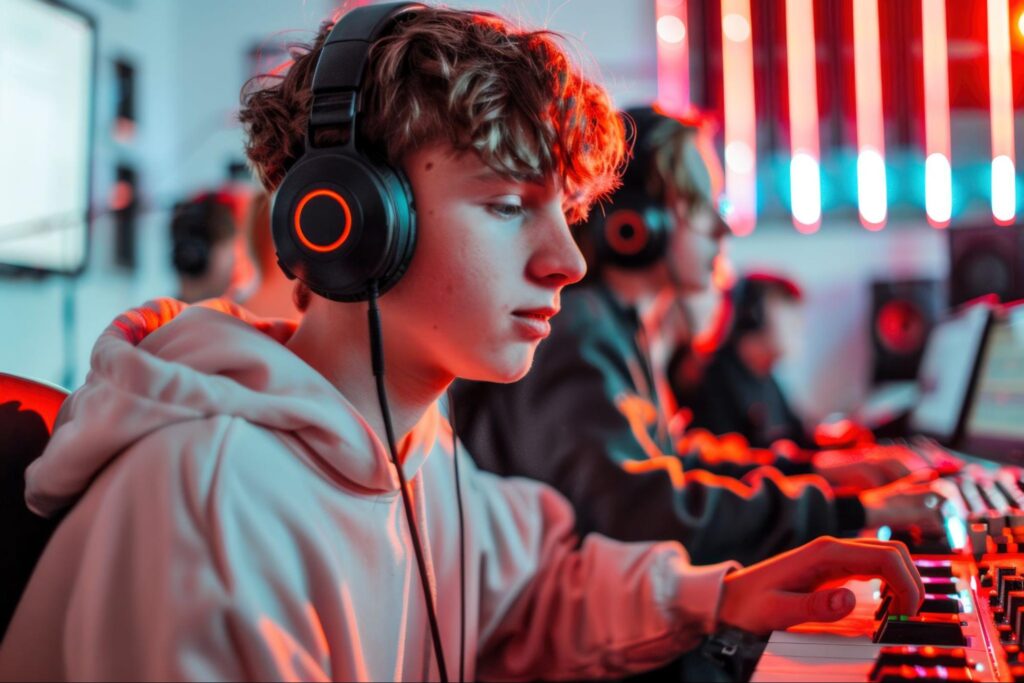Professional esports athlete status goes beyond playing video games endlessly because it demands special skills. To compete at a professional level in gaming, athletes need advanced skills alongside swift choices and prolonged mental strength. Professional esports athletes need daily training, strategic analysis, and extended tournament concentration abilities. Competitive esports differs from casual gaming because of demands for organized training habits and team-based play, along with dynamic adjustments to game rules. Professional esports teams accept competition-naive players who graduate from inferior online competitions at an early stage.
The Skills Required to Compete at the Highest Level
Professional esports athletes depend on three key elements: precise motor skills, strategic thinking abilities, and mental resilience capabilities. Response time stands as a critical factor because professionals execute moves with speeds measuring milliseconds. Strong knowledge of game systems allows players to predict enemy moves so they can modify their approaches.
The reaction time capabilities of professional esports athletes reach up to 100–150 milliseconds exceeding the 200–250 milliseconds reaction times of fighter pilots. The quick-moving titles CS:GO and League of Legends require speedy decision-making and precise movements during stressful moments where reaction speed proves essential for esports success.
The achievement of success in multiplayer games requires both team collaboration together with clear communication channels. The long duration of tournaments requires mental endurance to succeed. Professionals acquire effective methods to handle defeats, which leads to better performance. The competition demands that players dedicate their time to training between eight to twelve hours daily.
However, looking at the gigantic fees of cyber sportsmen, you begin to understand why all this was necessary. It is hard not to envy the size of the professionals’ rewards. If you are also a devoted fan of computer games but are not yet ready to devote your life to a mouse and WASD from start to finish, pay attention to betting online. Yes, today, you can bet not only on classic sports but also on virtual battles. Predict the victory of the strongest team in a tournament, bet on the score of a match or special event markets – in a word, become a real cyber sports analyst and get good money for your forecasts. Anyone can try – registration is free and fast, and the entry threshold is minimal.
Daily Training: How Esports Athletes Stay Competitive
Casual gamers are just playing for fun. However, professional players follow structured training routines to maximize performance. A typical day includes:

- Game mechanics practice – Refining aiming, movement, and reaction speed.
- Strategy analysis – Studying opponents and rewatching matches.
- Team coordination – Practicing communication with teammates.
- Physical exercise – Preventing strain injuries and maintaining overall health.
To avoid burnout, professionals balance solo practice with team sessions and take regular breaks. Consistent training helps them adapt to updates, new strategies, and evolving competition.
The Importance of Physical and Mental Health in Esports
Long practice hours can lead to hand strain, back pain, and eye fatigue. To prevent injuries, professional players incorporate stretching exercises, hand training, and ergonomic setups.
Mental endurance is equally important. High-pressure tournaments and long training sessions can cause stress and burnout. Many esports athletes work with psychologists to improve focus and manage anxiety. Proper sleep, a balanced diet, and scheduled breaks help sustain performance and allow players to train consistently without setbacks.
The Role of Coaching and Team Support
Behind every successful esports athlete is a structured support system. Coaches refine strategies, analyze gameplay, and develop training plans. They study opponents, identify weaknesses, and adjust tactics to keep their teams competitive.
Teams also employ analysts who review match data to help players improve decision-making. Many organizations provide fitness trainers and mental health specialists to ensure players stay in peak condition. Boot camps and practice sessions help players build chemistry with teammates, making communication and trust key factors in competitive success.
For all eSports fans (and especially bettors), there is also a support corner. This is the largest betting community, the official public of one of the largest bookmakers in the country – MelBet India Instagram. There you will find announcements of new tournaments, discussions about teams and hot news about players, the best highlights, and of course – forecasts and betting tips from real pros. Join the club of like-minded people and earn the victories of your favorite eSports teams.
The Financial Reality of Being an Esports Athlete
Top esports professionals gain access to big prize money sponsorships and salaries, but only a few manage to reach the highest-paying leagues. The majority of esports professionals generate earnings from multiple streams, which include compensation from their teams, tournament winnings, streaming revenue, and brand endorsements.

The Dota 2 event called The International 10 achieved its highest prize pool total of $40 million in 2021. Team Spirit claimed the championship victory at The International 10 Dota 2 tournament, taking away $18 million in prize money that surpasses the standard earnings of several traditional sports’ premier events, such as tennis and golf tournaments.
A player needs to maintain steady gameplay because their contracts and sponsorship deals frequently adjust according to their performance level. Most esports athletes end their competitive careers between 25 and 30 years old because their reaction times decrease alongside their experience of burnout. Following their competitive career, most esports players choose to work as coaches, create content, or manage esports teams.
The Future of Esports Athletes
Esports has become a highly competitive industry, requiring a combination of skill, discipline, and endurance. Professional players follow strict training schedules, maintain physical and mental health, and rely on coaches and analysts to stay ahead. While financial rewards can be high, few reach the top, and career longevity remains a challenge.
As the industry evolves, new opportunities emerge in coaching, content creation, and team management. With the continued growth of global tournaments and sponsorships, esports athletes must constantly adapt to remain competitive. Those who combine talent with dedication have the best chance of building a lasting career in this rapidly changing field.


